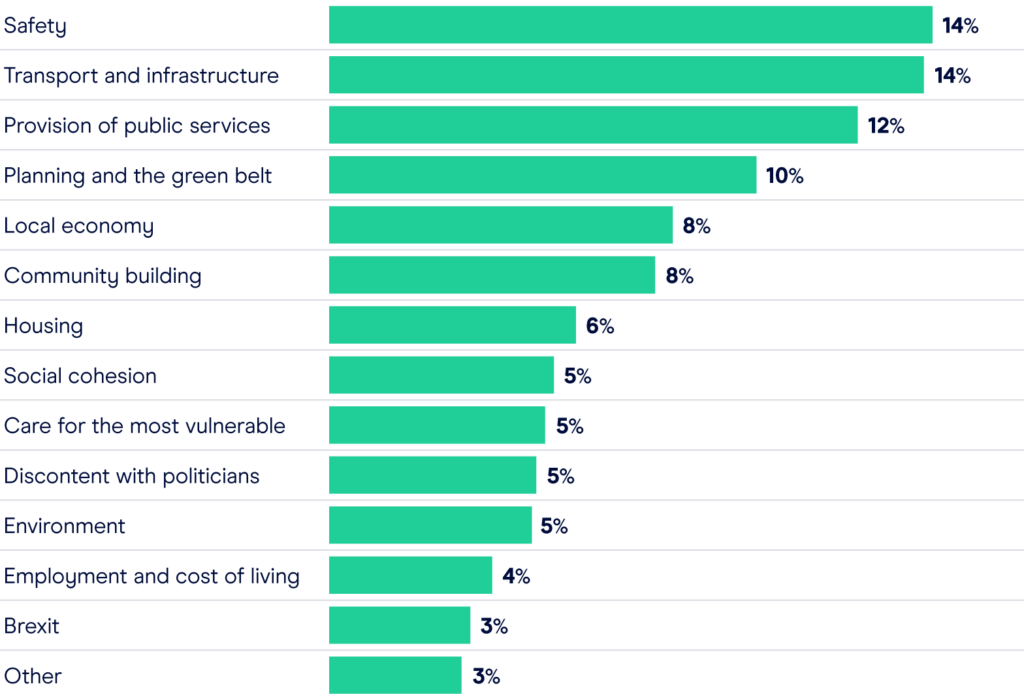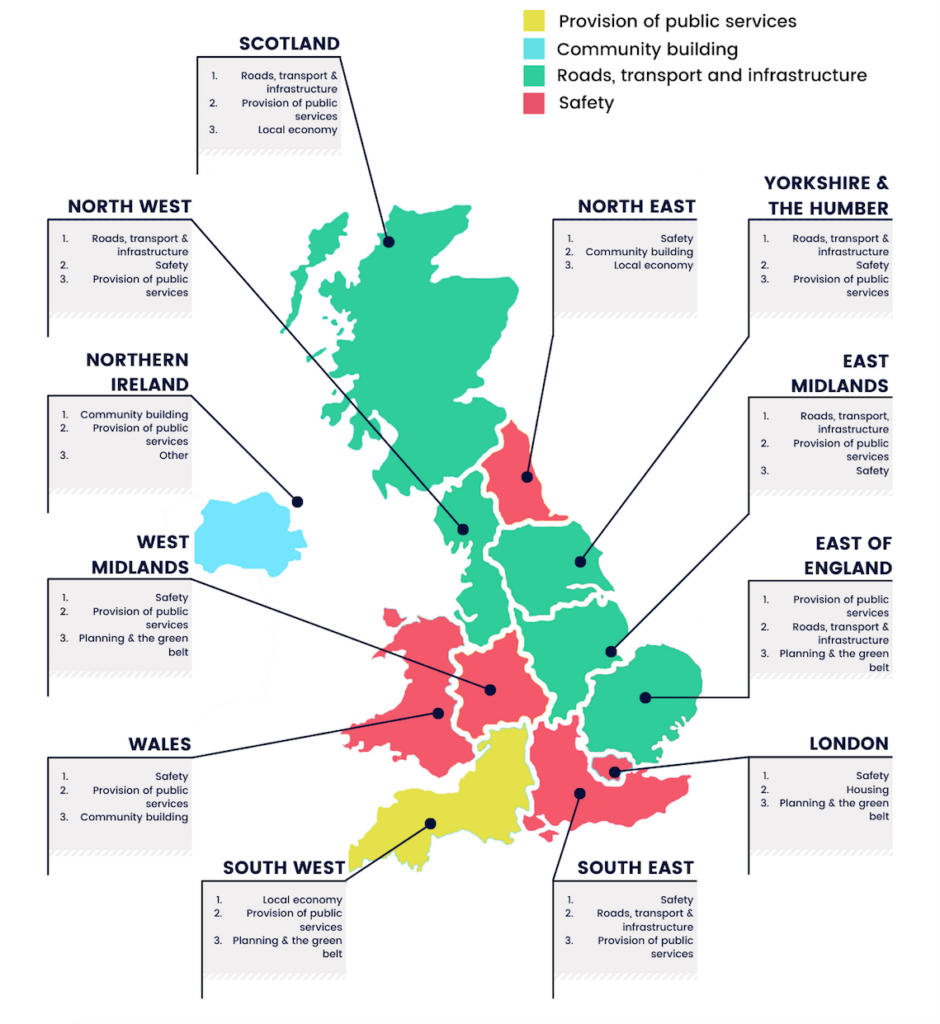ICS research sheds a new light on communities’ agenda for this general election
In a general election dominated by big national issues, our new research looks at what matters to people in Britain: community. Over the last three months we’ve been asking, ‘What is the top issue that matters most for the future of your community?’ travelling to communities across all four nations of the UK and engaging in discursive and open research with people on the frontline of experience of the issues core to party manifestos and to political debate.
The results are striking; revealing a picture of priorities that goes beyond political instability and uncertainty on issues such as Brexit to focus instead on a hard-hitting agenda for change in local life.
Improving safety; transforming infrastructure, public service provision and welfare, investing in local economies and caring for the most vulnerable in society are in the top ten issues resulting from our nationwide research. Whilst valuable polls such as Ipsos Mori’s Issues Index show Brexit retaining the top spot as the biggest issue facing Britain at national level, results at local level where political decisions such as austerity are most visible and hardest felt, tell a different story focused less on binary choices and seeking instead for a programme of repair, reconnection and revitalisation which will recognise what is seen as a damaged and neglected social fabric.
What is the top issue that matters to the future of your community?
(% of open-ended responses that mentioned the issue)

Results in focus:
Our data, gathered with 2,200 people across the UK found concerns about feeling less safe in local communities to be the leading concern, followed closely by infrastructure, improving public services and building local economies.
- Safety: communities report increased experiences of crime, concerns over rising crime and perceived feeling of being less safe. Parallel to this, concerns over ineffective policing and justice system, are ported lack of visible police presence; negative perception of police tactics to address crime and their efficacy (including slow or lacking response rates to crime); and concerns over lack of sentencing or penalty for crimes.
- Transport and Infrastructure: straining and inadequate infrastructure including roads and public transport, is a particular concern for older voters but a high concern across all voting groups.
- Provision of Public Services: need for repair of the welfare systems including health, education and services for young people and children is raised as a high concern. The highest specific concern is that provision of public services has not been funded to keep up with the growth of new housing developments. Communities are worried that regeneration is not taking into account the growing burden on already strained and depleted services including healthcare and GP appointments, school places, and basic amenities – and that there is an absence of listening and consulting with communities about what people-focused services they need.
- Planning and the Green Belt: the planning of housing; access to affordable housing; and the subsequent disappearance and decline of natural and public spaces, is raised as an unsustainable trajectory that needs new solutions.
- Local Economy: lack of or uneven investment, concern over job opportunities; and visibly declining high streets present a picture of low economic resilience at local level.
- Community Building: the priorities for the future found people looking to community as a site of challenges, opportunities and of solutions. Communities’ awareness that complex problems such as the lack of social cohesion need people-based as well as system-based pathways for change was evident in social cohesion appearing as a separate but significant issue requiring change, with challenges of discrimination and experience of racism resonating through the research. More optimistically and perhaps surprising in its prominence in the study was the urge to build a greater sense of community and improved community life. Calls for ‘opportunities to mix and gather’; to ‘do more for each other’ and furthermore questions of how to achieve this in the technologically mediated, closing spaces of community today created a cacophony of voices which demand a deeper second listen.
I believe the standard of a community is how we treat our most vulnerable and I do include within that elderly, young and homeless people
Sheila, 27, Birmingham

Connections not isolation
When will we see an end to the austerity agenda that is running our communities into the ground?
Male, 49, Online
The lens of community prompts a different, holistic conversation where issues often presented as isolated or binary choices in election terms are recognised as inter connected. Our research shows that communities across the UK are well aware of the impact of political choices such as austerity on the delivery of other policy priorities that ranked highly, such as a lack of public service provision and concern over the rise of crime. In Birmingham, participants linked the lack and under funding of services with more visible consequences, such as increased vulnerability and loneliness:
“I think this goes hand-in-hand with a few of them – the need to create better services. If you had somewhere for the kids to hang out would you reduce crime? If you had somewhere for the older people to go would you reduce loneliness? To me these all kind of go hand-in-hand” (Angela, 41, Birmingham)
By contrast, the lower prominence of issues such as the environment could be reflective not necessarily of priority but of the lack of a community-level narrative. Subjects such as climate change which in their magnitude of causes and consequences are harder to engage with, presented a tangible challenge in what role communities – as opposed to governments, individuals or social movements – should play. That the environment is a concern within the vision of communities however, does offer food for thought for how the narrative around responsibility and action to preserve the environment could be adapted or strengthened to engage with the local level.
The death of the local pub, the death of the local high street – we’re becoming more isolated and more polarised all the time.
Barry, 31, Birmingham
This research is our first insight into a much deeper conversation that as suggested above, demands further examination: that of what community means today in the broader structure of society. The emphasis given to community building in our results recognises the need for solutions to repair a social fabric in people and place-based terms which many reported as being in decline or limited in existence. The rise in poverty and inequality and lack of investment in local economies were seen by participants as direct reasons why community life – local and place-based but also in its many people-focused forms – has struggled; with the closure of community spaces and opportunities contributing not only to the loss of community in visible terms, but to how divided we may be as a society.
Regional variations
Yesterday I saw in the newspaper that Bradford missed out on millions of pounds to re-do one of the main streets here in the centre. The money will go toLeeds and some other city, which are already more developed. So I am just thinking Why?
Marina, 37
Segmentation of analysis across the UK reveals important differences of priorities according to region, in an election dominated by discussion of regional swing-seats and the impact they might have on the national picture. Safety received the highest weighting in the country in London, with the influence of reported rising crime, particularly the awareness of incidences of knife crime, but also the visibility of drug abuse and anti-social behaviour appearing to create a climate of insecurity in terms of public safety. London also reported highly the need for affordable housing and the concerns about the strain of population levels on infrastructure such as public transport, putting in focus the delayed large infrastructure projects such as HS2 and concerns that regeneration is neglecting vital amenities.
What are the top issues that matter for the future of your community?

Scotland prioritised investment in infrastructure, investment in the local economy and concerns about repairing society following austerity as its highest issues; the particular concern to avoid further public sector cuts and privatisation of public services and assets, suggests communities are looking to a very different social welfare agenda than that led from Westminster in the last ten years.
Wales prioritised improving public services, improving safety, preserving green and natural spaces and building stronger communities (in people and place-based terms), whilst Northern Ireland, where concern about the unpredictable influence of Brexit on maintaining peace in local communities has been well reported, showed a significant difference to other areas by placing building stronger communities as its leading issue alongside addressing safety. Northern Ireland also saw the highest level of discontentment with politicians and governance at national and local levels.
Within a regional picture differing on particular individual issues, those which were agreed upon received broad consensus: public service provision, infrastructure and improving safety ranked in the top three issues across 75% of communities in the UK.
Quick to care?
If they invested more, would we then feel that they haven’t forgotten us or would it then be that they’re not using the funding properly?
Medhi, 30
What resounds through our research is a feeling not just of heightened uncertainty over the future of communities, but of a mixture of hope and concern. Unsurprisingly for those who work in and with local communities on a daily basis, discontent with politicians at local and national level was in the top ten of issues that communities tell us need attention; Brexit is not. The results beneath the surface give us an insight into what this means: resolving the lack of transparency in government; lack of faith in elected representatives, and feeling unheard and forgotten in many parts of the UK.
These are issues raised by all communities which cut across all party politics, requiring repair to our democratic politics and a change in how elected representatives engage with ordinary people that goes far beyond this election and whether the big issues get done.
Looking local brings greater legitimacy
This research is part of our central process at the Institute for Community Studies to co-create an agenda with Communities about ‘what matters’ to them, using innovative methods for community-led research at scale which build on the long track record of deep insights and detail-driven research with communities started by Michael Young in the 1950s.
The research puts an emphasis on self-generation of issues through free text responses: rather than restricting respondents to a limited, multiple choice selection as with many traditional polls, our method leaves it open for respondents to highlight any and the many issues they want to raise. Our team engaged with a nationally representative sample of over 2,200 people in this way, using a combination of online and face to face approaches to ensure those with limited capacity for digital methods or low internet use were not left out of the conversation.
That the responses are unprompted and unforced is vital for us in wanting to see an organically grown picture of what communities see as important to their future. In this case, it means we saw more issues, with the weighting for each issue appearing less stark than the high percentages seen on traditional polls. None the less, those issues that recur to be in the top ten are significant. Safety is four times more important to communities than Brexit; infrastructure and public services three. Methods which prompt or restrict the selection of answers may miss a vital or unexpected issue through assuming a narrative of what is happening in communities in the UK, rather than allowing them to tell their own story.
The responses are coded into sub-themes which in turn, are grouped to make up primary themes. Rather than coding in research speak, we have stayed as close as possible to the vocabulary used verbatim by respondents when highlighting a concern. This is why ‘hope for improvement’ and ‘nothing ever happens’ are two of our sub-themes; encompassing the optimism of communities looking to a time beyond the political stasis which has hampered delivery of public policy in the UK over the last three years, but simultaneously frustrated or even fatigued by the lack of change they see at the local level.
Our Thriving Communities launch at Rich Mix brought communities and those working with them to the centre of conversations about what matters and decision making for the future, which all too often only happens at the national level. It’s a conversation we will be continuing actively through engaged research approaches as we work towards the publishing of our full research agenda in Spring 2020.
Emily Morrison is the Head of the Institute for Community Studies, powered by the Young Foundation.
Emily.morrison@youngfoundation.org
Institute for Community Studies Posted on: 29 November 2019 Authors: Emily Morrison,
